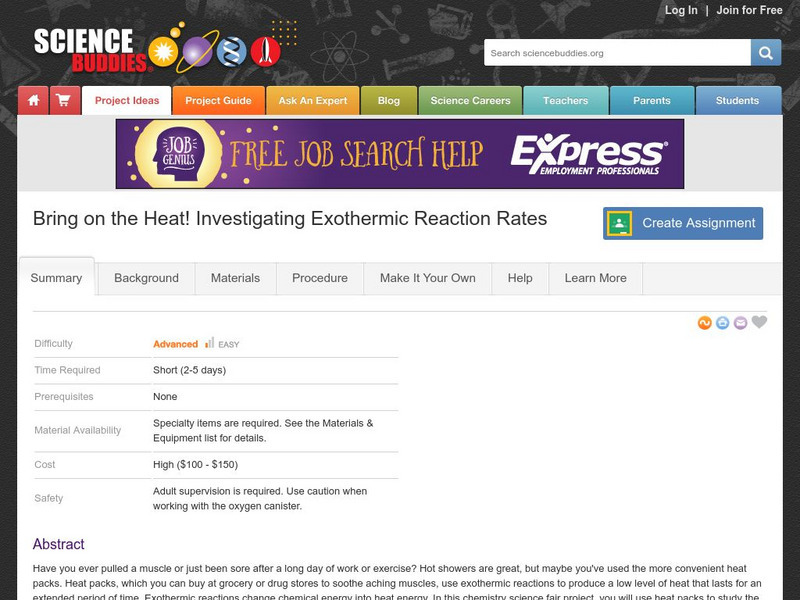Hi, what do you want to do?
Curated OER
AP: Chapter 9: Respiration - Extra Credit 1
Don't just use this as an extra credit assignment! The two scenarios on this handout give microbiology hopefuls an opportunity to practice critical-thinking skills. They apply their knowledge of cellular respiration and the products of...
Curated OER
Things Are Heating Up!
Third graders study how heat is produced from mechanical and electrical machines and human activities.
Concord Consortium
Concord Consortium: Stem Resources: Greenhouse Light and Temperature
An interactive tool where students can create a model of a greenhouse and use a light sensor to measure the amount of light it receives from a lamp at various times of the day. Temperature is also measured. Data is plotted on graphs,...
Science Buddies
Science Buddies: Bring on the Heat! Investigating Exothermic Reaction Rates
Have you ever pulled a muscle or just been sore after a long day of work or exercise? Hot showers are great, but maybe you've used the more convenient heat packs. Heat packs, which you can buy at grocery or drug stores to soothe aching...
Utah Education Network
Uen: Things Are Heating Up!
Heat is produced from mechanical and electrical machines and human activities.
Utah Education Network
Uen: The Heat Is On
Compare relative differences in the amount of heat given off through simple investigations.
Utah Education Network
Uen: Trb 3:5 Investigation 1 Is It Hot in the Light?
Learn why things in direct sunlight are warmer than things that are not in as much sunlight.
Utah Education Network
Uen: Trb 3:5 Investigation 7 Rubbing Objects Together
Third graders will understand that heat may be produced when objects are rubbed together.
CK-12 Foundation
Ck 12: Earth Science: Temperature and Heat in the Atmosphere Study Guide
[Free Registration/Login may be required to access all resource tools.] Discusses the characteristics of temperature and heat and how they behave. Includes some questions to check for understanding.
US Energy Information Administration
U.s. Eia Energy Kids: Energy Units Basics
Instructions for converting the physical measurements of different types of fuels, such as gallons or barrels, to British thermal units (Btu), allowing for cross-comparison.










